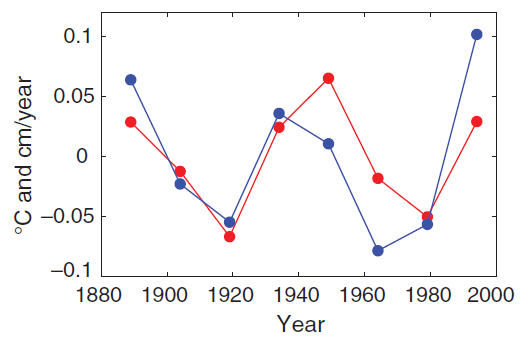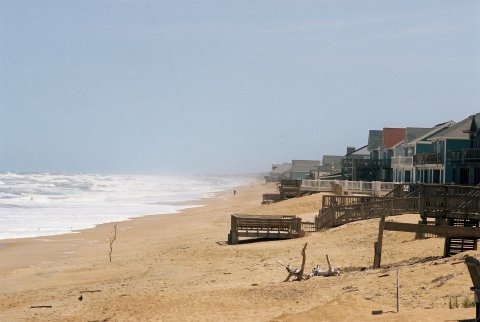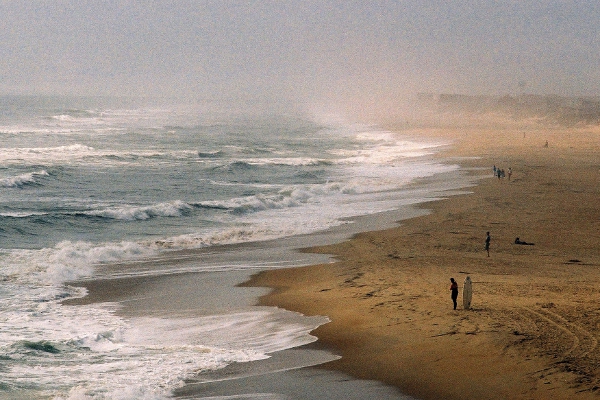Recently a group of researchers from Harvard and Oregon State University has published the first global temperature reconstruction for the last 11,000 years – that’s the whole Holocene (Marcott et al. 2013). The results are striking and worthy of further discussion, after the authors have already commented on their results in this blog.
[Read more…] about Paleoclimate: The End of the Holocene
The inevitability of sea level rise
Guest post by Anders Levermann [via The Conversation]
![]()
Small numbers can imply big things. Global sea level rose by a little less than 0.2 metres during the 20th century – mainly in response to the 0.8 °C of warming humans have caused through greenhouse gas emissions. That might not look like something to worry about. But there is no doubt that for the next century, sea level will continue to rise substantially. The multi-billion-dollar question is: by how much? [Read more…] about The inevitability of sea level rise
Sea-level rise: Where we stand at the start of 2013 — Part 2
This is Part 2 of my thoughts on the state of sea-level research. Here is Part 1.
Sea-level cycles?
A topic that keeps coming up in the literature is the discussion on a (roughly) 60-year cycle in sea level data; a nice recent paper on this is Chambers et al. in GRL (2012). One thing I like about this paper is its careful discussion of the sampling issue of the tide gauges, which means that variability in the tide gauges is not necessarily variability in the true global mean sea level (see Part 1 of this post). I want to add some thoughts on the interpretation of this variability. Consider this graph from my Response to Comments in Science (2007):

Fig. 1: Fifteen-year averages of the global mean temperature (blue, °C, GISS data) and rate of sea level rise (red, cm/year, Church&white data), both detrended.
[Read more…] about Sea-level rise: Where we stand at the start of 2013 — Part 2
References
- D.P. Chambers, M.A. Merrifield, and R.S. Nerem, "Is there a 60‐year oscillation in global mean sea level?", Geophysical Research Letters, vol. 39, 2012. http://dx.doi.org/10.1029/2012GL052885
- S. Rahmstorf, "Response to Comments on "A Semi-Empirical Approach to Projecting Future Sea-Level Rise"", Science, vol. 317, pp. 1866-1866, 2007. http://dx.doi.org/10.1126/science.1141283
Sea-level rise: Where we stand at the start of 2013
Progress has been made in recent years in understanding the observed past sea-level rise. As a result, process-based projections of future sea-level rise have become dramatically higher and are now closer to semi-empirical projections. However, process-based models still underestimate past sea-level rise, and they still project a smaller rise than semi-empirical models.
Sea-level projections were probably the most controversial aspect of the 4th IPCC report, published in 2007. As an author of the paleoclimate chapter, I was involved in some of the sea-level discussions during preparation of the report, but I was not part of the writing team for the projections. At the core of the controversy were the IPCC-projections which are based on process models (i.e. models that aim to simulate individual processes like thermal expansion or glacier melt). Many scientists felt that these models were not mature and understated the sea-level rise to be expected in future, and the IPCC report itself documented the fact that the models seriously underestimated past sea-level rise. (See our in-depth discussion published after the 4th IPCC report appeared.) That was confirmed again with the most recent data in Rahmstorf et al. 2012.
[Read more…] about Sea-level rise: Where we stand at the start of 2013
References
- S. Rahmstorf, G. Foster, and A. Cazenave, "Comparing climate projections to observations up to 2011", Environmental Research Letters, vol. 7, pp. 044035, 2012. http://dx.doi.org/10.1088/1748-9326/7/4/044035
Online video lectures on climate change
For those who’d like to get the basics of climate change explained first-hand by a climate scientist, here are two video lectures.
In the first, I show some of the basic data sets and findings about global warming, including some comments on historic land marks of our science.
The second lecture deals with the impacts of climate change (with a focus on extreme events and sea-level rise) and the possibilities for holding global warming below 2°C.
These lectures form part of a broader lecture course called World in Transition. It includes 11 themes, presented by the members of the German Advisory Council on Global Change (WBGU). This is a body of experts appointed by the German government and advising it on global change issues. The lecture series, for which international students can enrol and earn credit points, is based on the WBGU flagship report World in Transition – A Social Contract for Sustainability. This report describes how the transition to a sustainable, climate-friendly global economy and life style can be achieved.
Don’t estimate acceleration by fitting a quadratic…
… if your data do not look like a quadratic!
This is a post about global sea-level rise, but I put that message up front so that you’ve got it even if you don’t read any further.
The reputable climate-statistics blogger Tamino, who is a professional statistician in real life and has published a couple of posts on this topic, puts it bluntly:
Fitting a quadratic to test for change in the rate of sea-level rise is a fool’s errand.
I’d like to explain why, with the help of a simple example. Imagine your rate of sea-level rise changes over 100 years in the following way:
[Read more…] about Don’t estimate acceleration by fitting a quadratic…
Far out in North Carolina
The extensive salt marshes on the Outer Banks of Carolina offer ideal conditions for unravelling the mysteries of sea level change during past centuries. Here is a short report from our field work there – plus some comments on strange North Carolina politics as well as two related new papers published today in Nature Climate Change.

The Outer Banks of Carolina are particularly vulnerable to coastal erosion and sea-level rise, partly because the land is subsiding and the banks are naturally moving landward. On the ocean front, land is continually being lost.
[Read more…] about Far out in North Carolina
What makes sea-level rise?
Last week the science community was shocked by the claim that 42% of the sea-level rise of the past decades is due to groundwater pumping for irrigation purposes. What could this mean for the future – and is it true?
The causes of global sea level rise can be roughly split into three categories: (1) thermal expansion of sea water as it warms up, (2) melting of land ice and (3) changes in the amount of water stored on land. There are independent estimates for these contributions, and obviously an important question is whether their sum is consistent with the total sea level rise actually observed.

foto (c) Stefan Rahmstorf 2012
[Read more…] about What makes sea-level rise?
‘Wrong sign paradox’ finally resolved?
A group of colleagues has all but solved one of the greatest remaining puzzles in climate science. But the story is not one of scientific triumph – rather, it is so embarrassing that we had controversial discussions in our group whether to break this to a wider public at all.
The puzzle is known amongst climatologists as the “wrong sign paradox” – our regular readers will probably have heard about it. Put simply, it is about the fact that a whole number of things in climate science would fit very nicely together, if only the sign were reversed. If only plus were minus. [Read more…] about ‘Wrong sign paradox’ finally resolved?
Extremely hot
By Stefan Rahmstorf and Dim Coumou
One claim frequently heard regarding extreme heat waves goes something like this: ”Since this heat wave broke the previous record by 5 °C, global warming can’t have much to do with it since that has been only 1 °C over the 20th century”. Here we explain why we find this logic doubly flawed.
One can ask two different questions about the influence of global warming on heat waves (Otto et al. 2012), and we take them in turn.
1. How much hotter did global warming make this heat wave? [Read more…] about Extremely hot